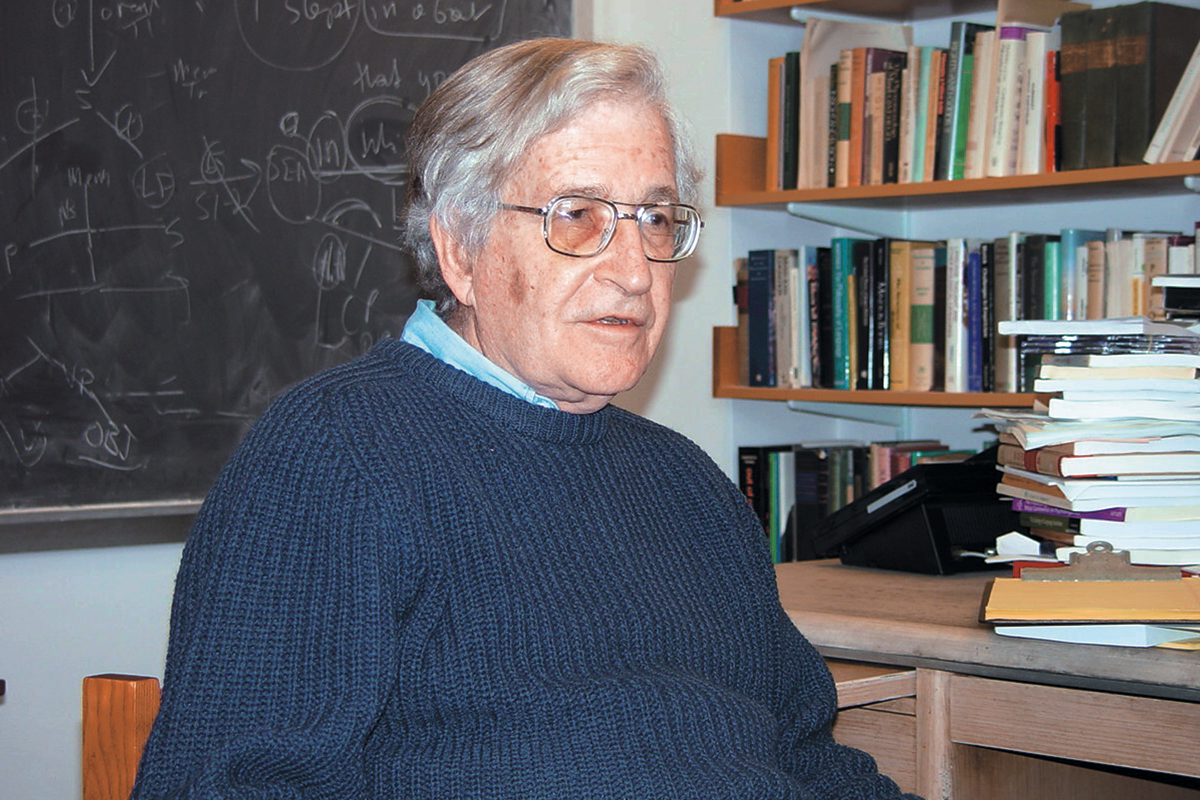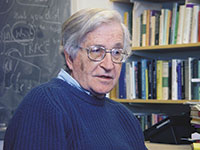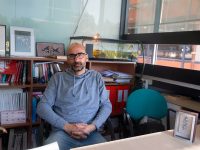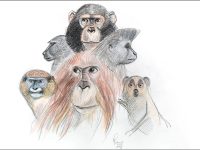
Noam Avram Chomsky (Philadelphia, 1928) turned the field of linguistics upside down in 1957 when “Syntactic Structures” was published. He argued, against the establishment, that the capacity for language acquisition is innate in humans and that language has a deep structure based on rules and universal mechanisms, common to all speakers.
(The following text is only a summary of the full interview published in Spanish and Catalan.)

Photo: W. Xiao
Some years ago you said in an interview that you have worked within different research fields, and also that you have worked within the field of mathematical linguistics having no credentials in mathematics. Some find that only people specialised in a particular field should talk about that particular field. In your opinion, who is competent to talk about a particular scientific subject?
Those who know what they are talking about. However, knowing about a subject has nothing to do with the titles that come before you name: graduate, doctor, professor…
There is some truth in what some say. I mean, if someone knows nothing of nuclear engineering and comments on the subject giving no evidence of what he or she is saying, better not to listen. However, if someone has studied nuclear engineering on his or her own and knows the subject, but has no academic qualification, it is fine. There are some people that do excellent jobs and have their works published in professional journals, but have never taken a course on linguistics. They have learnt on their own. In fact, I am one example of this reality.
Credentials and knowledge are two different things, and one can have credentials and know nothing of the subject.
«There are young people who cannot talk to their grandparents because they speak “local” languages while their grandchildren have learnt what is known as standard language»
Why do you think that linguistic diversity is valuable and should be protected?
For the same reasons I think we should protect Venice from destruction caused by floods. It is a landmark of human creativity and we have to protect it. Each language is the repository of a particular world-view in a world of cultural variety. We don’t need to explain why we have to protect them…Everyone was sad when they knew the Baghdad Museum had been destroyed. Why? Because it is a repository of the richness of human civilisation. And so are the languages spoken in central Australia.
Do you think that the Western way of life poses a threat for both cultural and linguistic diversity?
Of course. A great deal of this debate revolves around the Aborigine languages, pre-technological societies, the Amazon and other similar areas. But the same has happened in Europe for the last two centuries. The number of languages in Europe has dramatically decreased in the last two generations. There are many young people who cannot talk to their grandparents because they speak “local” languages while their grandchildren have learnt what is known as standard language —Italian, Spanish, German. These languages are second languages for most people, but have become dominant languages. In the meanwhile, a great variety of languages disappear vertiginously. In fact, Europe is hosting one of the main research projects on linguistics at the moment. Its name is Cartography Project and is sponsored by the European Union. Its goal is to study the great variety of languages existing in Europe before these languages disappear, because they will in a couple of generations.
«Each language is the repository of a particular world-view in a world of cultural variety»
In Italy, for instance, there is a great variety of languages. They call them dialects, but this does not mean anything. It means that on a map the whole of Italy is painted with the same colour, but in fact they are different languages, mutually incomprehensible, and they tend to disappear due to the homogenisation of society under the education system of the national state, the mass media, and such things. What is happening in Europe is similar to what is happening in the Amazon, North America, Mexico and elsewhere. It happens all around the world, but there is very little awareness of its happening in Europe.

Photo: W. Xiao
The only reason why this is not happening in the USA is because it is a very homogeneous territory. The USA, Canada and Australia are homogeneous from a linguistic point of view because settlers exterminated their native inhabitants. Had the Mongols conquered Europe and killed everyone, Europe would be linguistically homogenous as well.
So, how can progress in linguistics contribute to social change?
To me it is like progressing in astronomy —you get to a better understanding of the world. With linguistics we start to know better something of ourselves. However, its objective is not social change. You want to understand who we are, and if you understand this better, this information can be useful to help people. There is a lot of mythology regarding language that is used as a form of oppression. For instance, Black English, in the US, is considered a decayed dialect, and people who use it are treated disrespectfully because they are thought to have a lower level of intelligence. What I think is that, if blacks had all the money and whites had been the slaves, Black English would be the standard language and what I speak would be a decayed dialect.
But a sophisticated linguistic analysis is not necessary to realise this. What you learn in your first semester of university is enough to know that it does not make any sense.
«La majoria de les llengües senzillament no existeixen, en tenim unes quantes, de les possibles, aquí i allà»
Ever since the publication of Darwin’s works there has been a lot of speculation regarding the origins of human language. Darwin suggested that animal cries gradually became our human language. However, linguists are very sceptical regarding this kind of concepts and say that biologists seem not to grasp the complexity of human languages. The problem is that, if we do not accept a gradual evolution, our only choice left is creationism, a great mutation.
This is not true. Whatever language is, it is a recent development. It may only be 50.000 or 100.00 years old.
If you want to seriously analyse the evolution of human language, you have to look for homologous systems, systems that may have the same origins or even similarities. But animal cries are completely different in their characteristics, functions and any other aspects. They do not seem to have any of the characteristics of human language. They are two completely different systems.
In any case, Darwin’s suggestion was fine for his time, but I don’t think anyone believes it today.
What role do mutations play, then, and what do they involve from a creationist point of view?
Creationism is irrelevant here. Everyone agrees there was some kind of mutation along the way. If it wasn’t for mutations we would be…chimpanzees. In fact, mutations occurred, because we are not evolved chimpanzees. Without mutations, there would be no difference between bacteria and human beings. There is natural selection and other factors that choose from a wide range of possibilities created by mutations. The fact that there were mutations is not arguable. The question is what kind of mutations and which factors led to this system.
We have very few answers because they are complex questions.





